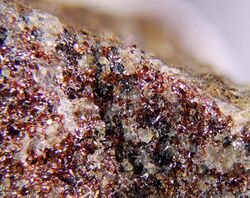Chemistry:Freudenbergite
| Freudenbergite | |
|---|---|
 | |
| General | |
| Category | Mineral |
| Identification | |
| Color | Brown |
Freudenbergite is a mineral that is named in honor of Wilhelm Freudenberg, palaeontologist at the University of Tübingen and the University of Göttingen, and curator for mineralogy and geology at the National Collections of Natural History in Karlsruhe. He studied Katzenbuckel rocks.[1]
Naturally occurring freudenbergite is a solid solution of two end members Na2Fe +32Ti6O16 and Na2Fe +2Ti7O16, which were referred to as low-Ti and high-Ti freudenbergite, respectively[2] Both varieties were found in the course of close examination of samples from the Katzenbuckel Complex, Germany, in which this mineral was documented for the first time[3] As a possible mineral Fe2+ analog was named UM1983-07-O:FeNaTi [4]
Monoclinic with straight extinction and high birefringence. Brown.
Synthetic freudenbergite was crystallized during the lamprophyllite incongruity melting.[5]
References
- ↑ "Mindat.org". https://www.mindat.org/min-1608.html.
- ↑ Mysen (1984). "Redox equilibria of iron in alkaline earth silicate melts: relationships between melt structure, oxygen fugacity, temperature and properties of ironbearing silicate liquids". Am. Mineral. 69: 834–847.
- ↑ Stahle (2002). "Occurrence of low-Ti and high-Ti freuden? bergite in alkali syenite dikes from the Katzenbuckel Volcano, southwestern Germany". Can. Mineral. 40 (6): 1609–1627. doi:10.2113/gscanmin.40.6.1609.
- ↑ "mindat". https://www.mindat.org/min-47676.html.
- ↑ Zaitsev (2013). "Phase Equilibria in the System Lamprophyllite-Nepheline". Geochemistry International 51 (11): 889–895. doi:10.1134/S0016702913110104. https://www.researchgate.net/publication/258169591.
Bibliography
Haggerty, S.E. (1983): A freudenbergite-related mineral in granulites from a kimberlite in Liberia, West Africa. Neues Jahrb. Mineral. Monatsch.: 375-384; in: Dunn, P.J., Cabri, L.J., Ferraiolo, J.A., Grice, J.D., Jambor, J.L., Mueller, W., Shigley, J.E., Puziewicz, J., Vanko, D.A. (1984): New mineral names. American Mineralogist: 69: 1194
Mysen B. O. , Virgo D. , and Seifert F. A. , “Redox equi? libria of iron in alkaline earth silicate melts: relationships between melt structure, oxygen fugacity, temperature and properties of iron?bearing silicate liquids,” Am. Mineral. 69, 834–847 (1984).
Smith, D.G.W., Nickel, E.H. (2007): A System of Codification for Unnamed Minerals: Report of the SubCommittee for Unnamed Minerals of the IMA Commission on New Minerals, Nomenclature and Classification. Canadian Mineralogist: 45: 983-1055; http://nrmima.nrm.se(2016)
Stahle V.; Koch M.; McCammon C. A.; Mann U.; Markl G., Wikidata Q105611595
Taylor L. A. and PokhilenkoN., “Ferrous freudenbergite in ilmenite megacrysts: a unique paragenesis from the Dalnaya Kimberlite, Yakutia,” Am. Mineral. 82, 991– 1000 (1997).
Yakovleva O. S. , “Mineral diversity of fenitized xenoliths in the Khibina Massif, Kola Peninsula,” in Mineral Diversity: Study and Conservation (Zemyata and Khorata, Sofia, 2009), pp. 193–199 [in Russian].
Zaitsev, V. A., Kogarko, L. N. and Senin, V. G. (2013) ‘Phase equilibria in the system lamprophyllite-nepheline’, Geochemistry International, 51(11), pp. 889–895.
 |

